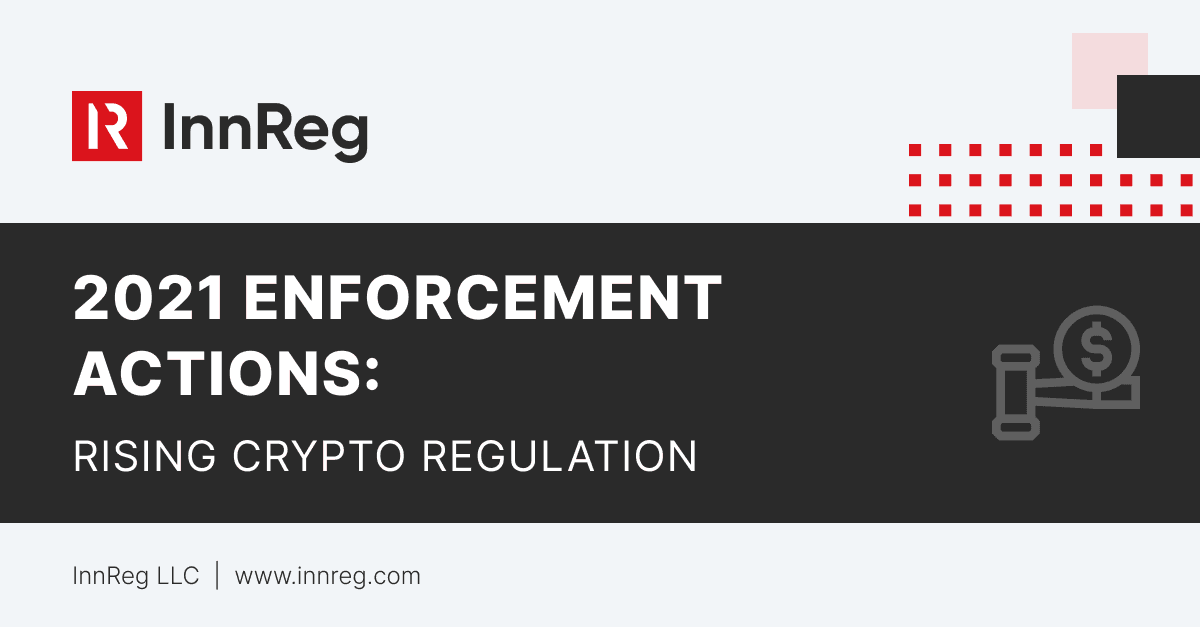
Blockchain
Three Major 2021 Enforcement Actions Signal Increasing Crypto Regulation Pressure
Aug 14, 2023
·
InnReg
·
5 min read
Contents
SEC blockchain regulation is rapidly coming into focus. Right now, cryptocurrency is considered the Wild West as there is not one centralized governing body to fully regulate it.
The SEC is turning its sight towards putting rules in place as to which cryptocurrencies can be traded on an exchange and how their exchanges are run.
See also:

InnReg is a global regulatory compliance and operations consulting team serving financial services companies since 2013. If you need assistance with compliance or fintech regulations, click here.
SEC Decision on Crypto Regulation
The SEC’s new interest in crypto regulation is led by its Chairman Gary Gensler, who recently asked Congress to provide the SEC with greater regulatory authority over the cryptocurrency space.
Cryptocurrency is currently an estimated $2.1 trillion industry, and Gensler warns that it cannot survive outside of regulation for long especially given the rampant fraud and instability of the current market. He further warned that investments are fundamentally based on trust, and consumers will not invest in a market that they feel they cannot trust.
The Current Crypto Regulation
Currently, there are two governing bodies in the US that have concurrent authority over portions of cryptocurrency regulation: the SEC and the Financial Crimes Enforcement Network (FinCEN).
Both of these organizations have enforcement powers over the few regulations that do exist in the crypto space, mostly based around anti-money laundering (AML) laws.
SEC Crypto News: Three Recent Cryptocurrency Regulatory Violation Cases
The SEC crypto news includes three recent enforcement actions taken by FinCEN in the SEC that indicate that both entities are taking a greater interest in the cryptocurrency market, signaling that greater regulation may be on the horizon.
1) BitMEX
On August 10, 2021, FinCEN announced a settlement with BitMex, one of the country’s oldest and largest fungible virtual currency exchanges, which was operating as an unregistered futures commodities merchant and engaged in repeated, willful violations of the Bank Secrecy Act which requires companies engaging in trades to comply with anti-money laundering regulations (AML) and perform regular customer due diligence to prevent scams and other illegal activity.
The Bank Secrecy Act requires companies particularly those working with large sums of money or a large number of customers to conduct regular checks of their customer’s accounts to ensure that the trades and transactions being conducted by those customers or on their behalf are in line with that customer’s business and goals. Any transactions outside a customer’s business or goals may be an indication of money laundering and require further investigation.
For several years, BitMex intentionally did not conduct this required customer due diligence and knowingly conducted business with money launderers and on the dark web. In fact, FinCEN estimated that in the six years involved in the lawsuit, Bitmex did at least $209 million worth of transactions on the dark web.
In addition, BitMex claimed that they were immune from the US AML regulations required by the SEC as they did not engage or do business with people located in the US. However, because they failed to do proper customer due diligence, BitMex had no way of verifying those claims and was found to be regularly engaging with users in the United States.
These willful violations of the Bank Secrecy Act and SEC anti-money laundering regulations resulted in a $10 million settlement with FinCEN. In addition to the civil monetary penalty, as part of the settlement, BitMex has agreed to hire independent consultants to help them establish an anti-money laundering compliance program. Like all AML compliant programs, BitMex’s new program must:
put procedures and structures in place to catch transactions that are potentially illegal,
have an independent outside party conduct a compliance audit of these regulations every year,
report to FINRA the person or people responsible for implementing and monitoring your compliance protocols within your business,
ensure that the appropriate personnel dealing with transactions that might violate the Banking Securities Act receive training and updated training when the regulations change as well as providing training when any of your procedures and protocols change, and
put protocols in place to conduct ongoing customer due diligence as well as training your employees on those procedures and what to do if red flags arise.
The independent consultants will also go through BitMex’s records for the past six years and help the company fill out Suspicious Activity Reports (SAR) for any potentially violative transaction to bring the company into further AML compliance.
2) DeFi Money Market (DMM)
In the first enforcement action dealing with a decentralized finance company, the SEC leveled accusations against Defi Money Market of selling approximately $30 million worth of unregistered securities as well as misrepresenting DMM’s effects and how the company functioned. The lawsuit ultimately resulted in a cease-and-desist order from the SEC, which includes forfeiture of over $12 million in profit and hundred and $25,000 in penalties.
In order to understand the settlement that was reached, it is first important to understand what exactly a decentralized finance company is. A decentralized finance company uses blockchain rather than an exchange, brokerage firm, or bank to capitalize and invest its assets.
The SEC found that both of the types of tokens that DMM offered qualified as securities and therefore needed to be registered in order to be traded. DMM failed to register their tokens and thus, violated the FTC rules and regulations.
In addition, the SEC found that DMM misled customers as to the digital assets that DMM owned, promising that their digital tokens were overcollateralized on social media and backed by approximately $9 million worth of car loans which DMM did not actually own.
3) Poloniex
On August 9, 2021, the SEC announced a $10 million settlement with Poloniex for running an unregistered digital asset exchange. For two years, Poloniex operated a digital asset exchange that was available to consumers in the United States but was not registered with the SEC as required by law under the Security Exchange Act Section 5.
The SEC further found that while trying to increase their profits, Poloniex aggressively marketed assets that were a medium risk for being considered securities on their platform and were ok with the risk expecting significant potential financial benefits for the company.
How Can You Avoid the Negative Impact of Crypto Regulations?
Given the rapidly changing cryptocurrency landscape, growing and more stringent regulations in the near future, and the SEC and FinCen’s recent wave of enforcement actions, it is critical that companies dealing with cryptocurrency partner with a compliance advisor.
An advisor can help comply with all of the latest rules and regulations and reduce the risk of non-compliance and adverse regulatory actions.
How Can InnReg Help?
InnReg is a global regulatory compliance and operations consulting team serving financial services companies since 2013.
We are especially effective at launching and scaling fintechs with innovative compliance strategies and delivering cost-effective managed services, assisted by proprietary regtech solutions.
If you need help with blockchain compliance, reach out to our regulatory experts today:
Published on Oct 10, 2021
Last updated on Aug 14, 2023
Related Articles
Latest LinkedIn Posts












